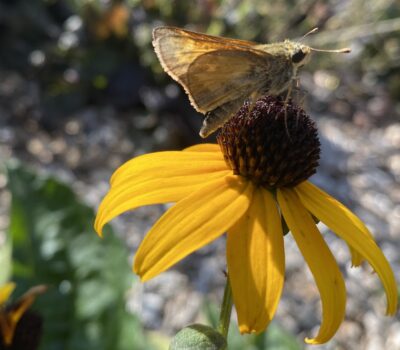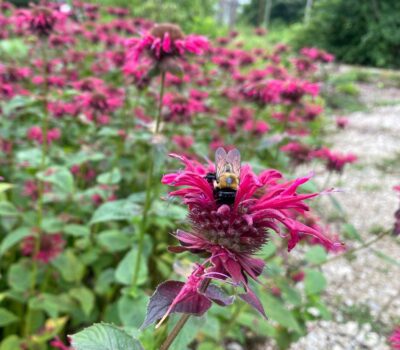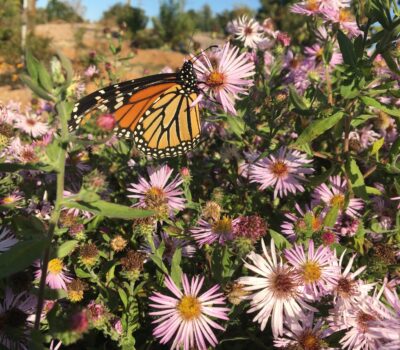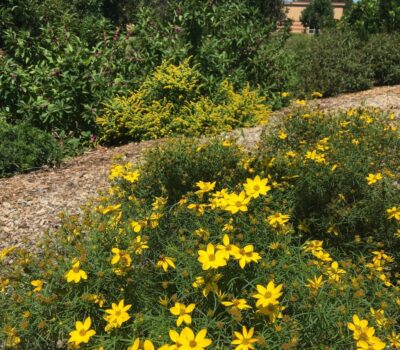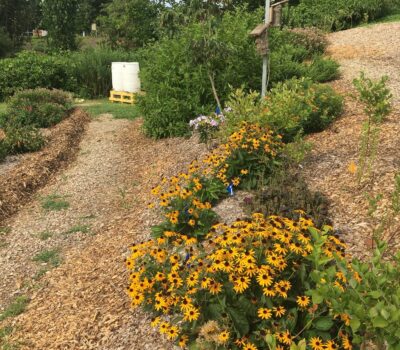Ask a Naturalist: Entomology Season at Gateway Nature Preserve
Did you know that the Gateway Nature Preserve is an ecoEXPLORE Hotspot? This means that it is a great place to explore and submit wildlife observations that are especially helpful to scientists. ecoEXPLORE has over 500 Hotspots across North Carolina. It is so exciting that we can have such a place right in the middle of the city!
Every two months, there is a different season of exploration when explorers can focus on a theme, make observations, and submit them for scientific study by making an ecoEXPLORE account and uploading photos. Starting in July through August, ecoEXPLORE’s badge will be themed for Entomology Season. Entomology is the study of insects. Insects are a very important part of our survival. Pollinators are responsible for the reproduction of 90% of the world’s plant species, including a variety of foods we consume.
Insects are important for forests ecosystems, agriculture, and the environment. Insects break down litter, recycle nutrients, and remove weak trees. Some insects such as bees, butterflies, moths, flies, and wasps are very important for pollinating major cash crops. Soil quality is dependent on insects; dead insects and insect droppings can be used as fertilizer and compost. Insects can consume unwanted weeds and even eat harmful insect pests. In addition, the food web depends on insects, they are a food source for birds, reptiles, fish, and mammals.
Besides being vital in the production of food, insects also help in the production of everyday use products such as candles and skin care products. In addition, they help our planet look beautiful by pollinating and spreading the seeds of native plants. There are so many benefits to providing food and shelter for our native insects. Winston Salem became a Bee City USA affiliate in 2018, to work on providing pollinators with healthy habitat and minimizing the use of pesticides.
Because insect numbers are steadily declining, we must ensure we try to maintain a healthy population of pollinators in our cities by planting native plants and helping protect natural spaces. Replacing non-native plants and lawns with native plants is a great start in creating habitat for valuable insects. Another benefit of planting natives is having low maintenance plants that are drought and freeze tolerant. The city of Winston Salem has published a list of native plants that can be used in our garden escapes for this zone. View the list here.
Here are seven ways to make your garden a haven for native pollinators/insects:
- Use pollinator-friendly plants in your landscape. Shrubs and trees such as dogwood, blueberry, cherry, plum, willow, and poplar provide pollen or nectar, or both, early in spring when food is scarce.
- Choose a mixture of plants for spring, summer, and fall. Different flower colors, shapes, and scents will attract a wide variety of pollinators. If you have limited space, you can plant flowers in containers on a patio, balcony, and even window boxes.
- Reduce or eliminate pesticide use in your landscape or incorporate plants that attract beneficial insects for pest control. If you use pesticides, use them sparingly and responsibly.
- Accept some plant damage on plants meant to provide habitat for butterfly and moth larvae.
- Provide clean water for pollinators with a shallow dish, bowl, or birdbath with half-submerged stones for perches.
- Leave dead tree trunks, also called “snags,” in your landscape for wood-nesting bees and beetles.
- Support land conservation in your community by helping to create and maintain community gardens and green spaces to ensure that pollinators have appropriate habitat.
The Gateway Nature Preserve has been committed to protecting insect habitat since it was formed in 2008. Part of our efforts include preserving a wooded habitat, a meadow area, and a pollinator garden. With over 120 native trees, shrubs, and perennials, the pollinator garden provides a much-needed habitat for bees, butterflies, moths, and other pollinators, whose numbers have been depleted by development and by commercial agricultural practices. We also have some insect hotels that provide places for bees to lay their eggs.
You can stop by the preserve today to observe insects at work in the Forest Discovery Trail or the pollinator garden. You can hear the bees and flies buzzing all over colorful native plants such as Beebalm, Buttonbush, and Phlox. You can see the Monarch and Swallowtail butterflies feast on the nectar produced by Butterfly Weed. If you look closely, you can find ants and beetles hard at work, spreading seeds and pollinating. So, stop by the preserve and contribute your observations this Entomology season. You can visit https://www.ecoexplore.net/badges for more information on how to participate.
